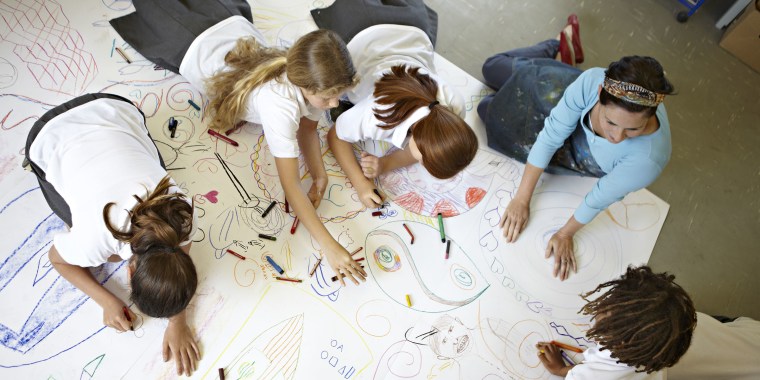Peer interaction and collaboration start early in life, and helping your child understand the value of working well with others is key to encouraging cooperation in group activities. Studies have shown that team activities help children learn how to respect and work with others and how to resolve conflicts respectfully. It’s also worth noting that group work will be more and more important in school, as well as in college and careers.
Encourage your child to participate in cooperative activities like sports, clubs, arts, and music. Try to find a balance between her activities, school, and family time so as not to overload her with too many activities, as this can lead to unnecessary stress. If your child participates in sports, remind her that she should apply caring and kindness to all her interactions in life, including competitions, and that everyone on the team brings their own set of unique skills to the field. Discuss the reasons why she should play sports or be a part of a club, such as being healthy and learning how to get along with others and how to persevere when losing. While very few children become professional athletes, all can learn important life skills through sports, both individual and team-based. Use snack or dinner time as an opportunity to talk about collaboration. Point out a fruit on the table, like an apple, and ask your child, “How did this apple get here?” Talk to your child about how many people had to work together to get an apple to the table. For example, the farmer had to water the trees, someone had to pick the apple, a truck driver had to move the apples to the store, etc. If you do this periodically with foods and household items, it will help your child appreciate collaboration and teamwork. It can also be a source of curiosity and entertainment, as kids this age enjoy hearing the story of how the obvious is not so obvious.
You can also teach your child about collaboration by taking her with you while you are running errands and pointing out what’s happening around her. Explain everything. For example, if you are at a grocery store, show her what the cashier or delivery person or shelf stocker is doing. This will help her understand different roles and how every person matters in order to make the grocery store work well.
Use art as a way to encourage group work for your child and her siblings or friends. After school or on a weekend, stick a long sheet of paper on a fence in the backyard or a wall in your home. Get out some markers, watercolor paints, or crayons and encourage the kids to make a mural. Together, they can all decide what the topic of the mural will be, and individually, they can choose what items or elements they want to paint, sketch, or draw. When they have completed their mural, talk to them about how their contributions made this masterpiece possible. By encouraging team activities, you are helping to teach your child about collaboration and nurture her ability to work well with others.
Parent Toolkit resources were developed by NBC News Learn with the help of subject-matter experts, including Maurice Elias, Director, Rutgers Social-Emotional and Character Development Lab; Judy Willis, Neurologist, Teacher, Author, International Lecturer, University of California, Santa Barbara; and Jennifer Miller, Author, Confident Parents, Confident Kids.
